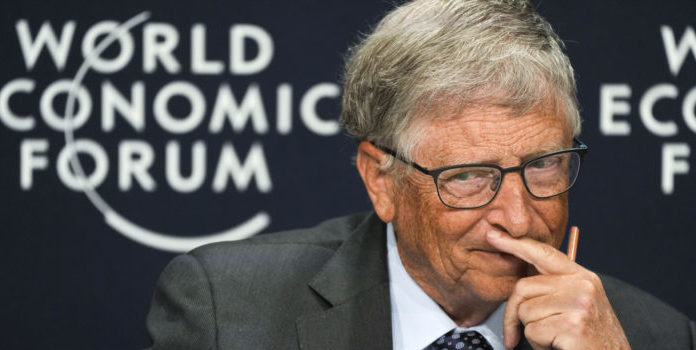(Headline USA) If Ukraine’s supplies remain off the market, the world could face a food availability problem in the next 10 to 12 months, and “that is going to be hell on earth,” World Food Program Executive Director David Beasley told the Associated Press in Davos.
The managing director of the International Monetary Fund likewise sounded the alarm on an impending food shortage while trying to reassure elites gathered at the World Economic Forum in Davos that the prospects of a global recession were lower than expected.
Kristalina Georgieva noted that the IMF expects economic growth of 3.6% for 2022, which is “a long way to global recession.” But she acknowledged that it’s going to be a “tough year.”
The US, while continuing to funnel money into the Ukraine boondoggle and other European ventures, is essentially hamstrung, from a leadership perspective, due to the ineptitude of the Biden administration, and a national recession is likely to arrive soon if it has not already.
The poor planning and stewardship of globalist leaders—perhaps intentional—is also leading to what could prove to be unprecedented supply shortages for civilized society in the modern era.
The brewing crisis—especially for countries in Africa, the Middle East and Asia that rely on affordable wheat, barley and sunflower oil that are blocked in the ports of major producer Ukraine—has been a key topic in Davos.
“The anxiety around access to food at a reasonable price globally is hitting the roof,” Georgieva said.
European Commission President Ursula von der Leyen accused Russia on Tuesday of deliberately bombarding grain warehouses across Ukraine and using food supplies as a weapon, an assertion U.S. Secretary of State Antony Blinken also has made.
“Russia is now hoarding its own food exports as a form of blackmail—holding back supplies to increase global prices, or trading wheat in exchange for political support,” said von der Leyen, the head of the European Union’s executive arm. “This is using hunger and grain to wield power.”
On Monday, Beasley urged billionaires like Elon Musk and Jeff Bezos to step up their contributions to the global stockpile.
Notably absent, however, was the name of Bill Gates, who has been aggressively buying farmland while also pushing for green alternatives like soy-based meat products.
Gates joined US climate czar John Kerry, Salesforce co-CEO Marc Benioff and several other business leaders at a panel in Davos on Tuesday, not to address the food crisis, but to discuss the ways businesses were colluding to push the green agenda.
“So many green products carry a price premium” compared with established fossil fuel technologies, Gates said. “… [T]the way you get rid of that is scale up the production.”
His comments came during a discussion about the First Movers Coalition, which now boasts 55 participating corporations, up from 30. Sweden, India, Japan, Denmark, the United Kingdom and other countries also joined.
Elites huddle every year to discuss ways to help save the world, though it’s unclear how much concrete action the meeting produces. P
Panels and announcements focused Wednesday on the future of Europe and the internet, helping poorer countries with low-cost medicine and climate change.
Economic and central bank officials debated the effects of moving abstract policy levers at their disposal, while company bosses outlined their worries about the business outlook.
“As we run our business, we think a correction is now well underway” in the global economy, Pat Gelsinger, CEO of chipmaker Intel, said on the sidelines of the meeting.
Gelsinger said the semiconductor industry is still grappling with supply-chain issues, including a slowdown in deliveries of the advanced equipment used to manufacture computer chips.
Besides the rising costs of fuel, food and other commodities that are causing a cost-of-living crisis, central banks are raising interest rates to tackle high inflation and China is seeing a slowdown amid COVID-19 lockdowns, said Gita Gopinath, IMF’s first deputy managing director.
“So we have a confluence of shocks hitting the world,” she said on a panel about global growth Wednesday.
It’s especially acute in Europe, which the war in Ukraine has revealed, European Central Bank President Christine Lagarde said Wednesday.
“Europe is 20% more open to global value chains vulnerabilities than any other markets in the world. So it’s not surprising that the breaking down and the bottlenecks of global value chains affect European companies and us more than others,” she said on a panel called European Unity in a Disordered World?
Others highlighted the uncertainty that’s rattling financial markets and complicating investment decisions for businesses.
Adena Friedman, president of the NASDAQ stock exchange company, said Monday on a panel on the U.S. economic outlook that “a selling decision is much easier than a buying decision” for investors who can’t see where things are headed.
Adapted from reporting by the Associated Press

